 Medina awarded a DeLill Nasser. Edgar Medina, Graduate Student in the Buchlar lab, received a DeLill Nasser award for Professional Development in Genetics for Spring 2019. Edgar is working to develop a member of an ancient lineage of Fungi as a new model to understand how the ultra-conserved gene networks that control cell division in Eukaryotes can change and rewire through evolutionary time. Edgar will attend the Fungal Genetics Conference in Asilomar, CA this March. To read more, click here.
Medina awarded a DeLill Nasser. Edgar Medina, Graduate Student in the Buchlar lab, received a DeLill Nasser award for Professional Development in Genetics for Spring 2019. Edgar is working to develop a member of an ancient lineage of Fungi as a new model to understand how the ultra-conserved gene networks that control cell division in Eukaryotes can change and rewire through evolutionary time. Edgar will attend the Fungal Genetics Conference in Asilomar, CA this March. To read more, click here.
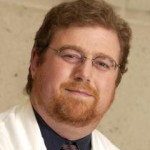 Sullenger named to National Academy of Inventors. Bruce Sullenger, PhD, Professor, was elected fellow of the National Academy of Inventors (NAI) Class of 2018, he is among 148 new fellows this year and join 11 other Duke faculty who have been recognized by the 7-year organization. To read more click here.
Sullenger named to National Academy of Inventors. Bruce Sullenger, PhD, Professor, was elected fellow of the National Academy of Inventors (NAI) Class of 2018, he is among 148 new fellows this year and join 11 other Duke faculty who have been recognized by the 7-year organization. To read more click here.
 Lowe announced as Whitehead Scholar. Craig Lowe, PhD, Assistant Professor, was awarded a Whitehead Scholarship by the School of Medicine. Craig is the tenth MGM Faculty Member to receive this prestigious distinction. The Lowe Lab is working to understand the genetic basis of vertebrate adaptation and disease. We are especially interested in understanding the genetic differences that underlie unique aspects of human biology. Some of these genetic differences have given humans unique and wonderful abilities, but other parts of our genome leave us predisposed to certain diseases and disorders.
Lowe announced as Whitehead Scholar. Craig Lowe, PhD, Assistant Professor, was awarded a Whitehead Scholarship by the School of Medicine. Craig is the tenth MGM Faculty Member to receive this prestigious distinction. The Lowe Lab is working to understand the genetic basis of vertebrate adaptation and disease. We are especially interested in understanding the genetic differences that underlie unique aspects of human biology. Some of these genetic differences have given humans unique and wonderful abilities, but other parts of our genome leave us predisposed to certain diseases and disorders.
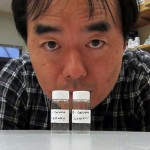 Matsunami featured on WRAL News. Hiro Matsunami, PhD, Professor, was featured on the WRAL morning news on Monday, January 7, 2019. Hiro discusses his recent paper published in Nature Communications about replacing drug-sniffing dogs with robotic noses. To watch the clip click here.
Matsunami featured on WRAL News. Hiro Matsunami, PhD, Professor, was featured on the WRAL morning news on Monday, January 7, 2019. Hiro discusses his recent paper published in Nature Communications about replacing drug-sniffing dogs with robotic noses. To watch the clip click here.
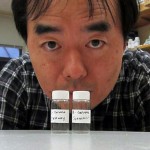 Matsunami, Thiele, and Franks receive DIBS Incubator Award. Hiro Matsunami, PhD, Professor in the Department of Molecular Genetics and Microbiology, Dennis Thiele, PhD, Professor in the Department of Medicine, and Kevin Franks, PhD, Assistant Professor in the Department of Neurobiology received a Duke Institute for Brain Sciences (DIBS) Incubator Award for their application, “Smelling Sulfur in Wilson’s Disease: toward an early and non-invasive diagnosis for the copper metabolism disorder.” They will receive $100,000 for their research project. DIBS supports innovative interdisciplinary research.
Matsunami, Thiele, and Franks receive DIBS Incubator Award. Hiro Matsunami, PhD, Professor in the Department of Molecular Genetics and Microbiology, Dennis Thiele, PhD, Professor in the Department of Medicine, and Kevin Franks, PhD, Assistant Professor in the Department of Neurobiology received a Duke Institute for Brain Sciences (DIBS) Incubator Award for their application, “Smelling Sulfur in Wilson’s Disease: toward an early and non-invasive diagnosis for the copper metabolism disorder.” They will receive $100,000 for their research project. DIBS supports innovative interdisciplinary research.

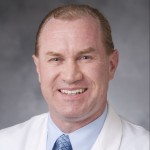
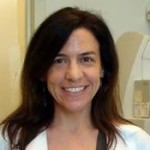
Luftig, Steinbach, and Tomaras, named AAAS Fellows. Micah Luftig, PhD, Associate Professor, and secondary MGM faculty members, William Steinbach, MD, Professor of Pediatrics and Georgia Tomaras, MD, Professor in Surgery were named Fellows of the American Associate for the Advancement of Science (AAAS). The new fellows will be presented with an official certificate and a gold-and-blue rosette pin on Saturday, February 16 during the 2019 AAAS Annual Meeting in Washington, DC. SOM Blog
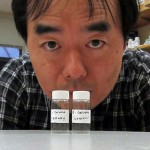 Matsunami featured in Duke Today and EurekAlert! Hiro Matsunami, PhD, Associate Professor in the Department of Molecular Genetics and Microbiology use animal stem cells to create an ‘e-nose’ for detecting explosives, drugs, and other compounds. To read the full article in EurekAlert, The Global Source for Science News, click here. To read the Duke Today article, click here. To read the full manuscript in Nature Communications, click here.
Matsunami featured in Duke Today and EurekAlert! Hiro Matsunami, PhD, Associate Professor in the Department of Molecular Genetics and Microbiology use animal stem cells to create an ‘e-nose’ for detecting explosives, drugs, and other compounds. To read the full article in EurekAlert, The Global Source for Science News, click here. To read the Duke Today article, click here. To read the full manuscript in Nature Communications, click here.
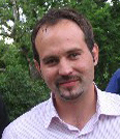 Bastidas research featured in Duke Today. Robert Bastidas, PhD, Assistant Research Professor in the laboratory of Raphael Valdivia, PhD, was featured in a Duke Today article titled, “Chlamydia attacks with Frankenstein Protein.” In partnership with Jonathan Pruneda, Assistant Professor at Oregon Health & Science University and several other researchers, Robert has shown that one Chlamydia protein, known as ChlaDUB1, is capable of manipulating human cells in two different ways, with one appearing to be essential for thriving inside the host. To read more, click here. To read the full manuscript, click here.
Bastidas research featured in Duke Today. Robert Bastidas, PhD, Assistant Research Professor in the laboratory of Raphael Valdivia, PhD, was featured in a Duke Today article titled, “Chlamydia attacks with Frankenstein Protein.” In partnership with Jonathan Pruneda, Assistant Professor at Oregon Health & Science University and several other researchers, Robert has shown that one Chlamydia protein, known as ChlaDUB1, is capable of manipulating human cells in two different ways, with one appearing to be essential for thriving inside the host. To read more, click here. To read the full manuscript, click here.
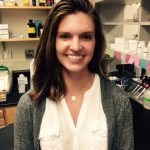
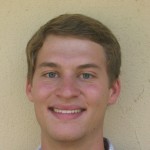
Brown and Gibbs received perfect scores on F31. Hannah Brown and Kyle Gibbs, two MGM graduate students received a perfect score of 10 on their most recent F31 submission. The title of Hannah’s project is, “Defining pH-Sensing in fungal virulence.” The research funded by this grant aims to explore how microbial organisms sense and respond to a change in environment in order to infect and cause disease. Specifically, I will study the human fungal pathogen, Cryptococcus neoformans and its ability to adapt to the more alkaline and warmer environment of the human lung as a way to understand this response. By better understanding how these pathogens manipulate themselves in order to better infect and coexist with the host, we aim to define new strategies to treat and clear microbial infections. The title of Kyle’s project is, “STAT3-dependent manipulation of host transcription and immune responses by Salmonella.” The research funded by this grant aims to determine both (1) how a novel Salmonella effector, SarA, drives the activation of the host transcription factor STAT3, and (2) how activation of STAT3, with accompanying host transcriptional changes, alters the host cell physiology to accelerate theintracellular replication of Salmonella, and thereby increase the virulence of sarA-containing Salmonella strains. Determining how SarA assembles a host signaling complex to phosphorylate STAT3 could provide a model for both other uncharacterized bacterial effectors and poorly characterized signaling by cytokine receptor intracellular domains. Understanding how, and to what end, SarA activates STAT3 during infection could open research into host-directed treatments for both infectious diseases and autoimmune disorders that are regulated by STAT3 signaling. Congratulations to both of them on this exciting news!
 Dr. Matt Scaglione arrives at Duke on January 1, 2019. Matt Scaglione is currently an Assistant Professor in the Department of Biochemistry at the Medical College of Wisconsin and will arrive at Duke January 1, 2019 in the Center for Neurodegeneration and Neurotherapeutics and the Department of Molecular Genetics and Microbiology. From Al La Spada, the center director: “Matt’s postdoctoral work was done with Hank Paulson at the University of Michigan and focused on how proteins are selected for degradation by the chaperone-ubiquitin-proteasome system, with an emphasis on how this regulates the accumulation of pathological protein aggregates. Since starting his own lab in 2013, Matt has begun using the amoeba Dictyostelium discoidium as a model system to study an inherent mechanism of resistance to polyglutamine-driven protein aggregation. He has discovered a chaperone protein that uses an amyloid decoy domain to interact with polyQ-expanded proteins and target them for degradation by the proteosome. More recently, he has identified a chaperone protein that forms a biomolecular condensate via phase-phase separation can prevent protein aggregation in Dictyostelium. These are fascinating stories that have potential clinical implications for neurodegenerative diseases. Matt is using a variety of genetic and biochemical approaches and is extending his studies to mice and human cells.”
Dr. Matt Scaglione arrives at Duke on January 1, 2019. Matt Scaglione is currently an Assistant Professor in the Department of Biochemistry at the Medical College of Wisconsin and will arrive at Duke January 1, 2019 in the Center for Neurodegeneration and Neurotherapeutics and the Department of Molecular Genetics and Microbiology. From Al La Spada, the center director: “Matt’s postdoctoral work was done with Hank Paulson at the University of Michigan and focused on how proteins are selected for degradation by the chaperone-ubiquitin-proteasome system, with an emphasis on how this regulates the accumulation of pathological protein aggregates. Since starting his own lab in 2013, Matt has begun using the amoeba Dictyostelium discoidium as a model system to study an inherent mechanism of resistance to polyglutamine-driven protein aggregation. He has discovered a chaperone protein that uses an amyloid decoy domain to interact with polyQ-expanded proteins and target them for degradation by the proteosome. More recently, he has identified a chaperone protein that forms a biomolecular condensate via phase-phase separation can prevent protein aggregation in Dictyostelium. These are fascinating stories that have potential clinical implications for neurodegenerative diseases. Matt is using a variety of genetic and biochemical approaches and is extending his studies to mice and human cells.”
 Jen-Tsan “Ashley” Chi, MD, PhD, Associate Professor in the Department of Molecular Genetics and Microbiologyand lab recently published new findings on unmasking blood doping in athletes. Read more about the findings in the Duke Today news release. Read the published research here.
Jen-Tsan “Ashley” Chi, MD, PhD, Associate Professor in the Department of Molecular Genetics and Microbiologyand lab recently published new findings on unmasking blood doping in athletes. Read more about the findings in the Duke Today news release. Read the published research here.
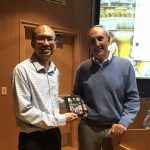 Professor Samuel Miller from University of Washington gave a talk entitled “Are Pathogenic Bacteria Just Looking for Food” for the Thursday Seminar Series on October 11. Dr. Miller served as the post-doctoral mentor for MGM faculty member Dennis Ko from 2006-2012. In appreciation for Dr. Miller encouraging mentees to take on high-risk, high-reward projects while providing the mentorship and support to succeed, Dennis presented him with a piece of the Apollo 11 command module foil, which served to protect astronauts during the moon mission.
Professor Samuel Miller from University of Washington gave a talk entitled “Are Pathogenic Bacteria Just Looking for Food” for the Thursday Seminar Series on October 11. Dr. Miller served as the post-doctoral mentor for MGM faculty member Dennis Ko from 2006-2012. In appreciation for Dr. Miller encouraging mentees to take on high-risk, high-reward projects while providing the mentorship and support to succeed, Dennis presented him with a piece of the Apollo 11 command module foil, which served to protect astronauts during the moon mission.
Sam is Professor of Medicine, Microbiology, Immunology and Genome Sciences at the University of Washington. He has made groundbreaking discoveries including sensing of pH and antimicrobial peptides by PhoP/Q, immune evasion through modification of LPS, antibiotic induction of biofilms, structure-function of the TTSS and associated effectors, evolution of Pseudomoas in the CF lung, mechanisms and visualization of c-di-GMP signaling dynamics, role of the microbiome in CF and Crohn’s disease, and novel systems to study host-pathogen interactions. These systems included expression of Salmonella effectors in yeast developed by his postdoc Cammie Lesser who was here last week, and cellular GWAS with the Hi-HOST approach that Dennis developed while in his lab. Most recently Sam has turned his attention to characterization of genes of unknown function in Acinetobacter.
Sam has authored over 200 publications and has been recognized with numerous honors including the Squibb Award from the Infectious Diseases Society of America, fellowship in the American Academy of Microbiology, the American Society of Clinical Investigation, and the American Association of Physicians.

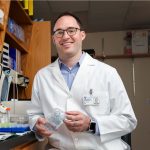
Heitman and Heaton received awards from ASM Joseph Heitman, M.D., Ph.D., Chair and James B. Duke Professor and Nicholas Heaton, Assistant Professor in the Department of Molecular Genetics and Microbiology have received awards from the American Society for Microbiology. Dr. Heitman received the ASM Award for Basic Research which recognizes an outstanding scientist whose discoveries have been fundamental in advancing our understanding of the microbial world. Dr. Heaton received the ASM Award for Early Career Basic Research which recognizes an early career investigator with distinguished basic research achievements in the microbioal sciences. Click here for the School of Medicine Blog post. Click here for the ASM 2019 Award Winners Announcement.
 Dr. John Rawls and collaborator Dr. Steven Farber from the Carnegie Institution were recently awarded a Pew Innovation Fund grant from the Pew Charitable Trusts. Their project uses zebrafish to investigate how dietary nutrients and microbes alter the body’s ability to sense glucose in the gut. The Pew Innovation Fund supports innovative interdisciplinary collaborations between former Pew Scholars and Fellows. Click here for more information.
Dr. John Rawls and collaborator Dr. Steven Farber from the Carnegie Institution were recently awarded a Pew Innovation Fund grant from the Pew Charitable Trusts. Their project uses zebrafish to investigate how dietary nutrients and microbes alter the body’s ability to sense glucose in the gut. The Pew Innovation Fund supports innovative interdisciplinary collaborations between former Pew Scholars and Fellows. Click here for more information.
MGM Faculty Search: Applications are invited for a faculty position at the Assistant (tenure track), Associate or Full Professor level in the Department of Molecular Genetics and Microbiology in the Duke University School of Medicine. The Department provides a focus for a wide range of research activities that include microbiology and virology, host-microbe interactions, RNA biology, genetics/genomics of model systems, and chromosome structure/metabolism. We seek an individual who will establish an outstanding research program that complements the existing strengths of the Department and addresses a significant biological or disease-related question. Excellent facilities and a competitive start-up package will be provided by the Department. Click here for more information.
 Dionna Gamble, a PhD candidate in the Jinks-Robertson lab, has been awarded a NIGMS Ruth L. Kirschstein National Research Service Award Indiviual Predoctoral Fellowship (F31). This award will support her research which centers around the repair of DNA double-strand breaks (DSBs) via homologous recombination (HR) in the budding yeast. Specifically Dionna is investigating the effect of different DSB end structures, created by nuclease platforms, on the intermediates and outcomes of HR.
Dionna Gamble, a PhD candidate in the Jinks-Robertson lab, has been awarded a NIGMS Ruth L. Kirschstein National Research Service Award Indiviual Predoctoral Fellowship (F31). This award will support her research which centers around the repair of DNA double-strand breaks (DSBs) via homologous recombination (HR) in the budding yeast. Specifically Dionna is investigating the effect of different DSB end structures, created by nuclease platforms, on the intermediates and outcomes of HR.
 Matsunami invited to serve as a member of the Chemosensory Systems Study Section. Hiro Matsunami, PhD accepted and invitation to serve as a member of the Chemosensory Systems Study Section at NIH effective immediately until June 30, 2022. Members are selected based on their demonstrated achievement in their scientific discipline as evidenced by the quality of research accomplishments, publications in scientific journals, and other significant scientific activities and honors. Congratulations Hiro!
Matsunami invited to serve as a member of the Chemosensory Systems Study Section. Hiro Matsunami, PhD accepted and invitation to serve as a member of the Chemosensory Systems Study Section at NIH effective immediately until June 30, 2022. Members are selected based on their demonstrated achievement in their scientific discipline as evidenced by the quality of research accomplishments, publications in scientific journals, and other significant scientific activities and honors. Congratulations Hiro!
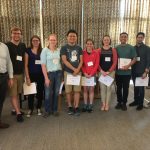 Fu and Pianalto awarded poster prize at the recent 2018 Cellular and Molecular Fungal Biology Gordon Research Conference. Ci Fu present the following poster entitled, “Filamentation promotes foraging for mating partners of the opposite mating type in Cryptococcus deneoformans”. In this project, we tested whether the unisexual filamentation phenotype has any ecological benefits in promoting foraging for mating. Through competitive mating assays using strains of different filamentation phenotypes, we found that filamentation does not promote foraging for mating partners of the same mating type, but when cells of the opposite mating type were present, filamentation could promote foraging for mating partners of both the same and the opposite mating types. Kaila Pianalto presented a poster entitled, “Multifunctional Nap1 Promotes Rim Alkaline pH Pathway Signaling in Cryptococcus neoformans through Protein Stability Maintenance.” The project I presented was describing the novel role for Nucleosome Assembly Protein 1 in the activation of the Rim pathway in Cryptococcus neoformans, a pathway that is required for sensing and responding to the host through changes in pH. I described how this protein likely is regulating the pathway through interactions with the pH sensor that are required for maintaining the protein levels of the sensor. I also described some new work that I am pursuing that is aiming to identify other mechanisms by which the pH sensor and the alkaline pH signaling pathway are regulated.
Fu and Pianalto awarded poster prize at the recent 2018 Cellular and Molecular Fungal Biology Gordon Research Conference. Ci Fu present the following poster entitled, “Filamentation promotes foraging for mating partners of the opposite mating type in Cryptococcus deneoformans”. In this project, we tested whether the unisexual filamentation phenotype has any ecological benefits in promoting foraging for mating. Through competitive mating assays using strains of different filamentation phenotypes, we found that filamentation does not promote foraging for mating partners of the same mating type, but when cells of the opposite mating type were present, filamentation could promote foraging for mating partners of both the same and the opposite mating types. Kaila Pianalto presented a poster entitled, “Multifunctional Nap1 Promotes Rim Alkaline pH Pathway Signaling in Cryptococcus neoformans through Protein Stability Maintenance.” The project I presented was describing the novel role for Nucleosome Assembly Protein 1 in the activation of the Rim pathway in Cryptococcus neoformans, a pathway that is required for sensing and responding to the host through changes in pH. I described how this protein likely is regulating the pathway through interactions with the pH sensor that are required for maintaining the protein levels of the sensor. I also described some new work that I am pursuing that is aiming to identify other mechanisms by which the pH sensor and the alkaline pH signaling pathway are regulated.
 Davey awarded an AHA Fellwoship. Lauren Davey, Phd, a postdoctoral fellow in the laboratory of Raphael Valdivia, was awarded an American Heart Association Research Award. Lauren’s research focuses on Akkermansia muciniphila, an intestinal bacterium that eats mucus produced by its host. Colonization with Akkermansia is associated with health and its abundance is inversely correlated with cardiovascular disease risk factors such as diabetes and obesity. Akkermansia is a promising candidate for a novel probiotic, however, it remains poorly characterized. To better understand this fascinating bacterium, I am developing genetic tools to study the molecular mechanisms of mucin degradation, intestinal colonization, and interactions with other bacteria that inhabit the mucus layer. Using a combination of high-throughput DNA sequencing and colonization models, I am working towards identifying genetic factors required for Akkermansia survival in vivo. By investigating how Akkermansia interacts with the host and other gut microbes, I hope to contribute to efforts to leverage microbial ecology as a treatment for cardiovascular disease and obesity.
Davey awarded an AHA Fellwoship. Lauren Davey, Phd, a postdoctoral fellow in the laboratory of Raphael Valdivia, was awarded an American Heart Association Research Award. Lauren’s research focuses on Akkermansia muciniphila, an intestinal bacterium that eats mucus produced by its host. Colonization with Akkermansia is associated with health and its abundance is inversely correlated with cardiovascular disease risk factors such as diabetes and obesity. Akkermansia is a promising candidate for a novel probiotic, however, it remains poorly characterized. To better understand this fascinating bacterium, I am developing genetic tools to study the molecular mechanisms of mucin degradation, intestinal colonization, and interactions with other bacteria that inhabit the mucus layer. Using a combination of high-throughput DNA sequencing and colonization models, I am working towards identifying genetic factors required for Akkermansia survival in vivo. By investigating how Akkermansia interacts with the host and other gut microbes, I hope to contribute to efforts to leverage microbial ecology as a treatment for cardiovascular disease and obesity.

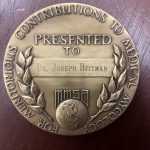
Joseph Heitman, MD, PhD received the 2018 Rhoda Benham Award from the Medical Mycological Society of the Americas (MMSA) for continuous outstanding or meritorious contributions to medical mycology (https://www.mycologicalsociety.org/rhoda_benham_award). The award and medal were presented at the MMSA Annual Banquet held in conjunction with the American Society for Microbiology (ASM) Microbe meeting in Atlanta, GA on Saturday June 9th, 2018. Rhoda Benham was a luminary and international expert in medical mycology who served on the faculty at Columbia University and Johns Hopkins University. Her work focused on clinical microbiology and in particular emphasized analysis and characterization of pathogenic Candida and Cryptococcus species and dermatophytes. Dr. Heitman joins an illustrious group of previous recipients of the Rhoda Benham award, which has been awarded annually since 1967, including notable Cryptococcus researchers June Kwon-Chung, Arturo Casadevall, John Perfect, and many others (https://www.mycologicalsociety.org/rhoda_benham_awardees). Dr. Heitman’s research program focuses on both model and pathogenic fungi, including studies on 1) the mechanisms of action and the targets of natural products including the discovery of TOR and FKBP12 as the targets of rapamycin, 2) the evolution and impact of sexual reproduction and the key discovery of unisexual reproduction among eukaryotic microbial pathogens, 3) how pathogenic microbes sense and respond to the host and environmental signals, 4) the structure, function and evolution of fungal mating type loci and fungal genomes, and 5) the role of the phosphatase calcineurin as a globally conserved fungal virulence factor including efforts to develop novel antimicrobial agents that target fungal calcineurin. Dr. Heitman is an elected fellow of the Infectious Diseases Society of America (IDSA), the American Academy of Microbiology, the Association for the Advancement of Science, the American Society for Clinical Investigation (ASCI), and the Association of American Physicians, and has previously received the ASBMB AMGEN Award (2002), the Squibb Award from the IDSA (2003), a MERIT Award from NIH-NIAID (2011-2012), and the Stanley Korsmeyer Award from the ASCI (2018). Dr. Heitman is James B. Duke Professor and Chair of the Department of Molecular Genetics and Microbiology, Duke University.
Rhoda Benham award talk 2018 and Rhoda Benham Dinner Talk
Tatjana Abaffy, Ph.D, Assistant Research Professor in the laboratory of Hiro Matsunami, M.D., recently published an online research article in Frontiers in Oncology that was featured by multiple news outlets including Duke Today. The article entitled, “A Testosterone Metabolite 19-Hydroxyandrostenedione Induces Neuroendocrine Trans-Differentiation of Prostate Cancer Cells via an Ectopic Olfactory Receptor”, discuss new research that one olfactory receptor plays a critical role in the progression of prostate cancer. They found that activating an olfactory receptor called OR51E2 in prostate cancer cells caused the cancer to morph into the more aggressive, ‘castration-resistant’ form of the disease. To read more, click on the following links: Duke Today; UPI; Frontiers in Oncology.
Dr. Dennis Ko has been awarded the 2018 Irving S. Sigal Memorial Award. Dr. Ko has made significant contributions that bridge microbiology, infectious disease, and human genetics. His pioneering work combining cellular microbiology with human genome wide association studies have identified human genetic differences that impact host-pathogen interactions and human disease susceptibility. This award, sponsored by the American Society of Microbiology and Merck, recognizes and awards excellence in basic research in medical microbiology and infectious diseases. The award is presented in memory of Irving S. Sigal, who was instrumental in the early discovery of therapies to treat HIV/AIDS. Click here for more information.
Kevin Zhu, a PhD candidate in the Matsunami Lab, has been awarded a NIDCD Ruth L. Kirschstein Predoctoral Fellowship. This award will support his research to develop and implement a novel method to map the receptor-specific target sites of olfactory neurons traveling from the nasal epithelium to the olfactory bulb.
Brooke D’Arcy, who joined the Silver Lab in March 2018, has been selected to receive a 2018 National Science Foundation (NSF) Graduate Research Fellowship Program (GRFP) Fellowship. The selection was based on her demonstrated potential to contribute to strengthening the vitality of the U.S. science and engineering enterprise.
Jackie Lin, an undergraduate student in the laboratory of Joseph Heitman, M.D., Ph.D., was awarded a 2018 Biology Faculty Award for outstanding intellectual achievements and excellence in research. Jackie will be listed as an awardee in the official graduation book published by the University and will be recognized at the Biology diploma ceremony with a plaque and gift. Congratulations Jackie on this impressive achievement.
Dr. Nick Heaton is the recipient of the the Hartwell Foundation‘s 2017 Hartwell Individual Biomedical Research Award and designation as a Hartwell Investigator. In selecting awardees, the Foundation takes into account the compelling and transformative nature of the proposed innovation, the extent to which a strategic or translational approach might accelerate the clinical application of research results to benefit children of the United States, the extent of collaboration in the proposed research, the institutional commitment to provide encouragement and technical support to the investigator, and the extent to which funding the investigator will make a difference. See the complete list of recipients here.
Dulcemaria Hernandez, a graduate student in the Coers Lab, received the NSF graduate research fellowship for 3 years.The NSF Graduate Research Fellowship Program (GRFP) helps ensure the vitality of the human resource base of science and engineering in the United States and reinforces its diversity. The program recognizes and supports outstanding graduate students in NSF-supported science, technology, engineering, and mathematics disciplines who are pursuing research-based master’s and doctoral degrees at accredited United States institutions.
Drs. Vance Fowler and Sallie Permar, MGM secondary faculty members, are the recipients of the 2018 Research Mentoring Award for Translational Research. The Research Mentoring Awards were created in 2009 to honor the outstanding research mentors in the Schools of Medicine and Nursing. Winners of this award demonstrate excellence in numerous aspects of mentoring, including accomplishments of individual mentees, programs implemented by the mentor, or by exceptional creativity in mentoring. These awards will be presented by Dean Mary Klotman at the annual Spring Faculty Meeting, which will be held at the Doris Duke Center, Duke Gardens on Wednesday, May 9, 4:45pm.
Dr. Bill Steinbach, MGM secondary faculty member, is the recipient of the 2018 Ruth and A. Morris Williams Faculty Research Prizefor his outstanding contributions in clinical science research. This award will be presented by Dean Mary Klotman at the annual Spring Faculty Meeting, which will be held at the Doris Duke Center, Duke Gardens on Wednesday, May 9, 4:45pm.
The Division of Human Genetics Scientific Retreat was held on Friday, March 16 at the NC Biotechnology Center in the Research Triangle Park. The keynote speakers were Stacey Gabriel from the Broad Institute and John Greally from Albert Einstein College of Medicine. There were several short talks from trainees and faculty along with a Happy Hour poster session. View the gallery here.
Every year, F1000Prime gives awards to faculty members who have worked especially hard writing F1000Prime article Recommendations that have proved popular with users in the previous year and also to those who have made an extraordinary contribution to F1000Prime’s service. Congratulations to Dr. Joe Heitman for receiving an ‘Outstanding Faculty Member of the Year’ award!
Michael Hoy and Giuseppe Ianiri both from the lab of Dr. Joseph Heitman, have received the Young ISHAM grant for the ISHAM 2018 conference. Michael has also been selected to give a short talk to students and postdocs at the event. Congratulations to Michael and Giuseppe! The International Society for Human and Animal Mycology conference is held in Amsterdam June 30 – July 4, 2018.
Dr. Micah A. Luftig has accepted the NIH’s invitation to serve as a member of the Virology-A Study Section, Center for Scientific Review. Members are selected on the basis of their demonstrated competence and achievement in their scientific discipline as evidenced by the quality of research accomplishments, publications in scientific journals, and other significant scientific activities, achievements and honors. Service on a study section also requires mature judgment and objectivity as well as the ability to work effectively in a group. His term will be from July 1, 2018 – June 30, 2022.
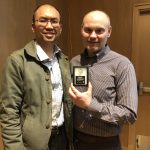 Professor Josh Akey from Princeton University gave a talk entitled “Genomic Tales of Human History” for a packed house at the UPGG Seminar on February 27. In gratitude for early support of his career as a postdoc at University of Washington, his MGM faculty host, Dennis Ko, presented him with a fragment of a Neanderthal hand axe.
Professor Josh Akey from Princeton University gave a talk entitled “Genomic Tales of Human History” for a packed house at the UPGG Seminar on February 27. In gratitude for early support of his career as a postdoc at University of Washington, his MGM faculty host, Dennis Ko, presented him with a fragment of a Neanderthal hand axe.
Dr. Shinohara, MGM secondary faculty member, has been selected to be a study section member of the Innate Immunity and Inflammation (III) Study Section at NIH. Study section members are selected on the basis of their demonstrated achievement in their scientific discipline as evidenced by the quality of research accomplishments, publications in scientific journals, and other significant scientific activities, achievements and honors. Study sections review grant applications submitted to the NIH, make recommendations on these applications to the appropriate NIH national advisory council or board, and survey the status of research in their fields of science. These functions are of great value to medical and allied research in this country.
The fungus that causes athlete’s foot and other skin and toenail infections may have lost its ability to sexually reproduce as it adapted to grow on its human hosts. The Heitman lab paper on toe fungus was recently published in Genetics and has been getting news coverage. Read more about the research at Duke Today.
Joe Heitman: two interviews about his research
JCI Insight article &Weill Cornell Medicine article
Animal Study Shows How to Retrain the Immune System to Ease Food Allergies: Soman N. Abraham, Ph.D., professor in Duke’s Department of Pathology and a secondary faculty member in MGM, is senior author of a study published this month in the Journal of Allergy and Clinical Immunology. Read the article by Duke Health here.
Our own Amy Hafez, graduate student in Micah Luftig’s lab, has been elected as one of the Graduate and Professional Student Council (GPSC) members of the Duke Board of Trustees. Amy will be defending her Ph.D. on March 8th and plans to pursue post-doctoral work in Science Policy. We will be excited to welcome her back during her three-year term on the BOT.
Joe Heitman, is the recipient of the 2018 American Society for Clinical Investigation’s (ASCI) Stanley J. Korsmeyer Award for his key contributions to our understanding of how eukaryotic microbial pathogens evolve, cause disease, and develop drug resistance; and his discovery of TOR and FKBP12 as targets of the immunosuppressive chemotherapeutic drug rapamycin. He will deliver the ASCI/Stanley J. Korsmeyer Award Lecture on April 20 at the upcoming AAP/ASCI/APSA Joint Meeting. For more information, see the interview published in the Journal of Clinical Investigation here, the School of Medicine blog here and Dean Klotman’s tweet here. Congratulations, Joe!
Congratulations to MGM secondary faculty, Sallie Permar and Georgia Tomaras for being elected AAM fellows! They were among 96 new fellows elected to the American Academy of Microbiology, an honorific leadership group.
Allison Roder, a PhD candidate in the Horner lab, has just been awarded an NIAID Ruth L. Kirschstein National Research Service Award Individual Predoctoral Fellowship (F31). This award will support her research on defining novel regulatory controls of hepatitis C virus envelopment. Congratulations Allison!
Congratulations to our Chair, Joe Heitman, for being a 2018 recipient of the Dean’s Award for Excellence in Mentoring. The recipients of the Dean’s Awards in Mentoring are recognized for helping to create a vibrant culture at Duke that values exemplary mentoring. The Dean’s Awards Ceremony will be on March 28, 2018 at 4:30 PM in the Sarah P. Duke Gardens.
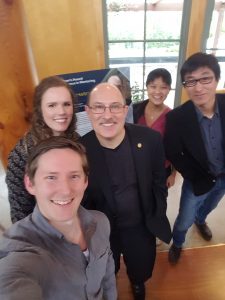
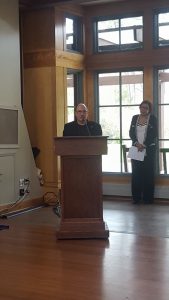
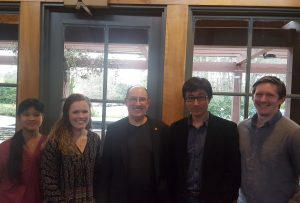
On January 27, some MGM faculty and students attended the Black Tie Dinner for the Duke Bouchet Society. The purpose of this dinner is to showcase and celebrate successful minority scientists produced by Duke University. It is a night of inspiration and encouragement as we gather together, not only for fellowship, but to also hear the stories of Duke Alumni that have gone on to be successful in their respective fields. Pictured is Emma Bonglack, Stacy Horner and Christine Vazquez.
Ted Espenschied in the Rawls lab took second place in the Pratt School of Engineering photo contest with an image capturing a cross-section of the intestine of a transgenic zebrafish. To see Ted’s photo entitled, “The Inside Track”, and the other winning photos, click here.
John Lu, an MGM SURE alumnus, and undergraduate researcher in the Luftig Lab, was recently named a Marshall Scholar. This prestigious fellowship enables students to pursue post-graduate studies in the UK. In the Luftig Lab, John has worked on biochemical characterization of the interface between EBV and host proteins that regulate B-cell transformation. As a Marshall Scholar, he plans to study health policy at the London School of Hygiene and Tropical Medicine followed by a year of research toward a master’s in biochemistry at Cambridge. After this training in the UK, he intends to complete an M.D./Ph.D. and then embark on a career to develop vaccines that can eradicate neglected tropical diseases. A full press release on Duke Today can be found here.
Division of Human Genetics Retreat – This free event will be on March 16, 2018 at the North Carolina Biotechnology Center. The event is open to all Duke faculty, students, and staff interested in human genetics. Our two Keynote Speakers will be Stacey Gabriel of the Broad Institute and John Greally of the Albert Einstein College of Medicine. The program will also include short talks and posters by trainees and a social hour. Email kristin.thole@duke.edu to register.
Duke named 5th globally in microbiology by US News and World Report There are many who have contributed to advance microbiology across our campus, including basic science and clinical departments, and the collaborative and collegial nature of the institution has fostered an environment that promotes interdisciplinary collaborations that advance excellence in microbial sciences. Duke has a history of strength and both depth and breadth in virology that began when Bill Joklik was Chair of the Department of Microbiology and Immunology and which continues to this day, in part sponsored by the Center for Virology and the Human Vaccine Institute. Similarly Duke has a history of excellence in mycology, and much of this stems from the tireless efforts of John Perfect, chief of the Division of Infectious Diseases in the Department of Medicine. In 2002 a group of investigators focused on bacterial pathogens were brought together (Meta Kuehn, Soman Abraham, Rich Frothingham, and Ken Wilson) and assisted in the recruitment of additional colleagues working on bacterial pathogens that led to the success of the Center for Microbial Pathogenesis, which became the Center for Host-Microbial Interactions. The Department of Molecular Genetics and Microbiology founded and supports and sustains the Center for Virology, the Center for Host-Microbial Interactions, and the Duke Microbiome Center, and thereby provides a series of forums that promote collaboration between basic scientists and physician-scientists. The success of microbiology as a discipline at Duke is attributable to many contribution centers, departments, institutes, and programs, and the faculty and colleagues who bring their talents and energy to bear on understanding our microbial world and developing ways to mitigate the impact of microbial pathogens on human health.” Joseph Heitman, James B. Duke Professor and Chair of the Department of Molecular Genetics and Microbiology.
“Duke MGM has led a successful effort to establish microbiome sciences at Duke. Recruitment of microbiome faculty into MGM formed a nidus that served to motivate and support other Duke faculty within and beyond MGM to engage in microbiome research. As a result, we now have a spectrum of exciting microbiome research projects happening at Duke. This includes development of novel computational approaches to understand and predict microbiome perturbations, design of new probiotics and prebiotics therapies, establishment of much-needed genetic tools for “genetically intractable” microbes, development of approaches for engineering environmental and host-associated microbiomes, and defining the molecular mechanisms by which microbiomes contribute to human diseases. These research projects have been supported by innovative graduate training programs such as the NSF-funded Integrative Bioinformatics for Investigating and Engineering Microbiomes (IBIEM) Program, and by the intellectual environment and resources provided by the new Duke Microbiome Center and other Duke Centers.” (John Rawls)
A reception to celebrate Duke University being named 5th globally in microbiology by US News and World Report was held on Tuesday February 27th, 2018, 4:30 to 6 or 6:30 pm, Great Hall, Trent Semans Center. The celebration was a time to thank the various groups who contribute to the success of microbiology at Duke by working so productively and collaboratively for recruitment, mentorship, and advancing research programs: The Human Vaccine Institute, the Global Health Institute, the Clinical Microbiology Laboratory, the Infectious Diseases Divisions of the Departments of Medicine and Pediatrics, and the Department of Molecular Genetics and Microbiology.
Link to US News and World Report: https://www.usnews.com/education/best-global-universities/microbiology
Lynne Zechiedrich, who was our invited guest speaker at the MGM retreat in 2016, was recently elected to the National Academy of Inventors. Lynne’s work on minicircles has been developing since the early 1990s. Twister Biotech, Inc. is a Baylor College of Medicine spin-out company from Lynne’s work. Read more about Twister Biotech here.